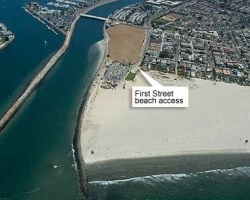The developers of the land on First Street, next to the San Gabriel River, are waiting for the California Coastal Commission to issue the required permit.
Ed Selich, the project manager for development of the property that many Seal Beach locals call the DWP property, said he has provided the Coastal Commission with everything it requires to issue a Coastal Development Permit. Now he’s waiting for the state agency to issue the permit.
“Any day, I’m hoping,” he said.
“I’m just hoping it’s soon,” he said.
In July, the city of Seal Beach paid $6,470.50 to AndersonPenna Partners to check the plans for the “Ocean Place” project as it is called by the property’s owners Bay City Partners.
Assistant City Manager Patrick Gallegos said: “AndersonPenna is doing the plan checks for all of the grading work and street improvements related to the Ocean Place project, as well as study reviews, coordination and oversight of the project. There are still multiple items that must be completed before a grading permit can be issued but we are attempting to make sure all reviews are completed in advance. There is a deposit account for the project and all Ocean Place invoices are being paid from that account.”
Gallegos confirmed that the money in the account comes from the Bay City Partners, not the city of Seal Beach.
The Coastal Commission approved the controversial project on Friday, March 13, 2015.
The commission set aside some lots originally intended for housing to instead be used for commercial “visitor serving” uses.
In 2015, Coastal Commission staff had recommended the application be denied. Costal staff also opposed the application that came before the commission in 2013. But the commission approved the project in 2015. The Coastal Development Permit was set to expire in March 2017, but Selich said the deadline to begin work on the project has been extended to March 2018.
After the grading and other improvements are made, the Bay City Partners still have to build a 6.4-acre passive park and turn it over to the city before building any residential housing.
Opponents of the project generally favor a previous version of the specific plan for the site, which called for a 150-room hotel and 70 percent open space.
The borders of the project area, and the definition of that 70 percent open space, had been disputed for years. The original specific plan, approved more than 30 years ago, called for a larger hotel than 150 rooms. Bay City Partners bought the land in 2003. In July 2012, the Seal Beach City Council unanimously approved changing the zoning to allow residential development.





